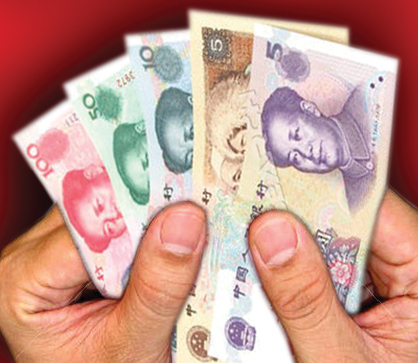 |
|
| Renminbi: Beijing forging pacts to promote currency |
In late July, the People’s Bank of China (PBoC) and the Swiss National Bank signed a currency-swap agreement aimed at bolstering trade and investment between their two countries. It was the latest in a series of pacts Beijing has forged with European countries to promote the renminbi as a global currency.
The swap deal is necessary for the development of the renminbi market in Switzerland. It allows the two central banks to buy currencies from each other up to a limit of 150 billion renminbi (US$24.46 billion), thus ensuring liquidity in both yuan, as the renminbi is also called, and Swiss francs when needed.
Similar agreements have been put in place with the Bank of England for pound sterling and with the European Central Bank for the euro.
Each of the major European financial centres has its own area of focus to develop the renminbi market, and no two are quite the same. As one player comments, “it doesn’t have to be a beauty contest”. Instead, the renminbi business is expected to grow according to the conditions in each of these markets and fuel the internationalization of the Chinese currency.
For Switzerland, private banking and commodities trading are two obvious areas of interest. Switzerland already has a sizeable renminbi business, serving clients at home, in China and other locations around the world.
Renminbi accounts in Switzerland are available for both private and corporate clients, and commodity trade finance is likely to be a key area for further renminbi development. Private banking and asset management services also stand to benefit from the guarantee of renminbi liquidity that the new swap line provides.
One jurisdiction where the renminbi business is making fast headway is Luxembourg.
In July, the country’s finance minister Pierre Gramegna led a finance industry delegation to Beijing, and witnessed the signing of a memorandum of understanding between the PBoC and the Central Bank of Luxembourg, which will pave the way for the designation of a renminbi clearing bank in the country.
 |
|
| Mackel: Luxembourg hopes to have its own RFQII allocation soon |
Preferred European HQ
A number of Chinese banks have chosen Luxembourg as their European headquarters, including Bank of China, ICBC and China Construction Bank. China Merchants Bank and Agricultural Bank of China also began the process of setting up bases in the grand duchy.
Luxembourg has built up a sizeable pool of renminbi loans and deposits, and is also leading the way in the listing of yuan-denominated bonds in Europe. Its fund management industry is quite active in the renminbi business.
In May, Bank of China, Luxembourg branch, listed its first offshore renminbi “Schengen” bond, named after the Luxembourg town where the agreement on the common EU travel area was signed.
The 1.5 billion renminbi bond offering was done out of the US$10 billion medium-term note programme of the Bank of China Group, and was the first Eurozone offering of renminbi bonds by a mainland Chinese entity.
“There is a critical mass of renminbi deposits and loans located in Luxembourg, and banks such as Bank of China, ICBC and China Construction Bank chose to locate their European headquarters here, initially helping Chinese companies move into Europe and later providing services to European companies in the Chinese market,” says Nicolas Mackel, CEO of Luxembourg for Finance, a private-public organization promoting the country’s financial industry.
“Each of the major European financial centres is taking its traditional strengths, and applying them to renminbi transactions with the help of central bank renminbi clearing arrangements, and clearly Luxembourg is going to focus on areas such as funds and bond listings,” he says.
There are already 40 yuan-denominated bonds listed on the Luxembourg Stock Exchange.
“Luxembourg hopes to have its own RQFII allocation in the near future, but we have already been chosen as the domicile for funds managed out of other financial centres such as London,” Mackel says, citing the three debt and equity funds launched recently by British fund manager Ashmore Group under the Renminbi Qualified Foreign Institutional Investor scheme. “Many fund managers are using Luxembourg domiciled vehicles for pan-European and global distribution.”
In late 2013, the Luxembourg regulator Commission de Surveillance du Secteur Financier (CSSF) authorized the first RQFII fund under the UCITS framework. In January, Hong Kong based fund manager Harvest Global Investments, together with Deutsche Asset & Wealth Management, launched an RQFII Exchange Traded Fund which tracks the CSI300 Index. The ETF is listed on the London Stock Exchange, but domiciled in Luxembourg.
The latest figures from global payments platform SWIFT show that Europe now represents 10% of all renminbi payments worldwide in value. SWIFT produces an RMB Tracker report, and the latest issue shows that European payments directly exchanged with China and Hong Kong in renminbi increased by 105% between July 2013 and July 2014.
“For most of these European hubs, Greater China still remains the main trading partner in renminbi,” says Michael Moon, head of payments and renminbi, Asia-Pacific, at SWIFT. “However, there seems to be a noticeable shift in business for some countries like Luxembourg, with an increasing share of truly offshore flows (with no Greater China leg). In the future, we will see a bigger contribution from truly offshore flows in the internationalization of the Chinese currency.”
UK, Paris calling
London is also positioning itself as a centre for the listing of renminbi denominated bonds as well as for renminbi asset management business.
In 2013, Britain received an RQFII quota of 80 billion yuan, allowing UK-based asset managers to buy and sell Chinese stocks, bonds and money market instruments.
For the UK, London’s status as the world’s biggest foreign exchange trading hub gives it an edge in the rivalry to dominate offshore renminbi currency trading in Europe. In June, the Bank of England appointed China Construction Bank as the London renminbi clearing house, under a previous memorandum of understanding signed with the PBoC in March.
“The move towards greater internationalization of the renminbi by the Chinese authorities is one of great importance that the bank strongly supports,” says Jon Cunliffe, deputy governor for financial stability at the Bank of England.
In addition to FX trading, the UK sees opportunities in listing offshore renminbi bonds and renminbi-denominated export finance. In late June, the UK Export Finance (formerly known as ECGD) signed a memorandum of understanding with China to begin structuring its first renminbi supported deals for capital equipment. UKEF will work closely with HSBC on the project.
UKEF provides loan guarantees for exporters. Having paid what is in effect an insurance premium to UKEF, they can then access very cheap bank debt to support exports. The initial sector being targetted by UKEF is commercial aerospace, which involves the export of Airbus aircraft to China. Many of these aircraft also have Rolls Royce engines.
France is also pushing hard to strengthen its ties with China, and French asset managers were given an RQFII allocation of 80 billion renminbi in 2013. In June, Banque de France signed its own bilateral agreement with PBoC to set up a renminbi clearing and settlement infrastructure in Paris.
In addition to Chinese equities, the Chinese bond market is increasing interest to foreign investors, and an efficient European clearing mechanism for renminbi and currencies such as the pound, euro and Swiss franc is going to aid this investment process.
Under the bilateral agreement signed with the PBoC in July, for example, the Swiss central bank can invest part of its foreign exchange reserves in the Chinese bond market.
Ashmore, on the other hand, launched the Ashmore Chinese Debt Fund in September to profit from Chinese debt securities issued by sovereigns, quasi sovereigns, and public and private sector corporates denominated in renminbi.





.jpg)
.jpg)


